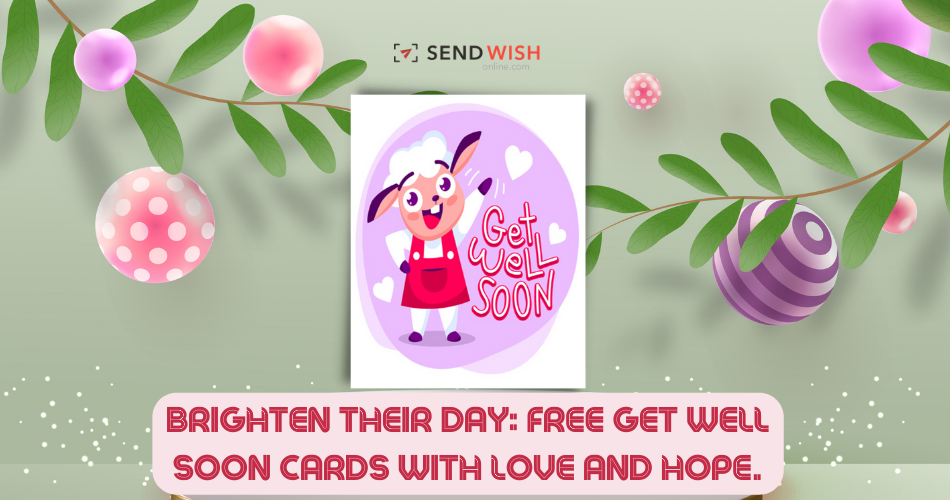Introduction:
Get well soon cards have become a common way to express empathy, sympathy, and support for individuals facing illness or injury. These cards serve as a tangible representation of our care and concern for the well-being of others. However, the way in which get well soon cards are perceived and used can vary significantly across different cultures. This article explores the cultural perspectives on get well soon cards, shedding light on how these expressions of compassion differ around the world.
Western Cultures:
In many Western cultures, get well soon cards are considered a thoughtful and considerate gesture. They are often seen as a way to show support and provide encouragement to someone who is unwell. These cards typically feature heartfelt messages, cheerful designs, and well wishes for a speedy recovery. Western societies value the individual’s autonomy and independence, and get well soon cards are seen as a personal touch that helps bridge the distance between the sender and the recipient.
Eastern Cultures:
In contrast to Western cultures, Eastern cultures such as China, Japan, and Korea have their unique perspectives on expressing well wishes to the ill. In these cultures, there is a greater emphasis on collective harmony and maintaining face. Consequently, the focus is often on sending messages that convey good luck, blessings, and positive energy to the recipient. The content of the cards may not explicitly mention the illness but instead offer words of encouragement, strength, and hope. Additionally, symbolic gestures such as sending fruit baskets or flowers are commonly practiced to wish for a swift recovery.
Middle Eastern Cultures:
Cultural perspectives on get well soon cards in Middle Eastern countries are influenced by Islamic traditions and values. In these cultures, the emphasis is on prayers and supplications for the well-being of the individual. Get well soon cards often feature religious verses, Quranic quotes, or prayers seeking divine intervention for healing. These cards serve as a reminder of the community’s support and the belief in the power of faith. They provide solace and encouragement to the recipient and their family during challenging times.
Indigenous Cultures:
Indigenous cultures across the globe have their unique ways of expressing well wishes and support during times of illness. These cultures often have deep connections with nature and the spiritual realm. Rituals, ceremonies, and traditional healing practices play a significant role in their approach. Instead of physical cards, they may engage in rituals such as smudging, chanting, or creating handmade crafts as a means of sending healing energy and positive intentions to the unwell person. The focus is on holistic healing that addresses the physical, emotional, and spiritual aspects of well-being.
European Cultures:
Within Europe, there are various cultural perspectives on get well soon cards. In countries like Germany, France, and Italy, get well soon cards are often seen as a way to express sincere concern and support. These cards may feature warm messages, poetry, or religious references. In some regions, it is common to send small gifts or flowers along with the card to uplift the spirits of the recipient. In Scandinavian countries, there may be a more reserved approach, with simple and understated messages that convey empathy and well wishes without being overly sentimental.
Visit to:- wedding greeting card
Latin American Cultures:
In Latin American cultures, get well soon cards are often personalized and filled with heartfelt messages. These cards emphasize the importance of family and community support. It is common for multiple family members or friends to sign the card, expressing their solidarity and love. Additionally, religious symbols, such as crosses or images of saints, may be included to invoke blessings and healing. Latin American cultures also place importance on physical presence, so it is not uncommon for loved ones to visit the sick person in person, bringing along the get well soon card as a token of their affection.
African Cultures:
Africa is a continent rich in cultural diversity, and perspectives on get well soon cards can vary greatly across different regions. In some African cultures, oral traditions and storytelling play a significant role in conveying well wishes to the unwell. Instead of written cards, individuals may share anecdotes, poems, or songs in person or over the phone to uplift the spirits of the sick person. Other African cultures may adopt the use of physical cards, often featuring vibrant colors and traditional patterns. These cards are a way to send messages of hope, encouragement, and prayers for a speedy recovery.
Conclusion:
Get well cards are a powerful and universal expression of compassion and support. While their purpose remains the same across cultures, the ways in which they are perceived and utilized can vary significantly. Whether it is the individualistic approach of Western cultures, the collective harmony of Eastern cultures, the religious undertones of Middle Eastern cultures, or the holistic healing practices of Indigenous cultures, the intention behind these cards is to provide comfort, hope, and strength to those facing illness. By understanding and respecting these cultural perspectives, we can ensure that our gestures of goodwill are received in the spirit they are intended, fostering empathy and connection across cultural boundaries.


















